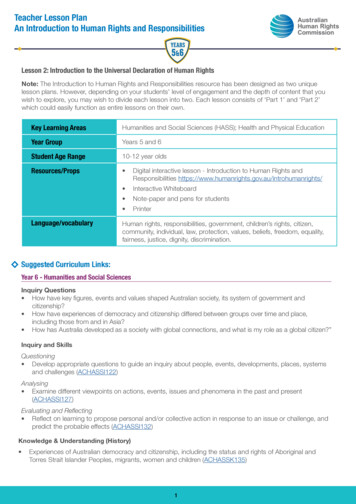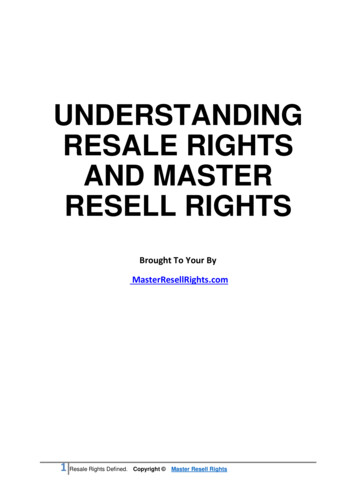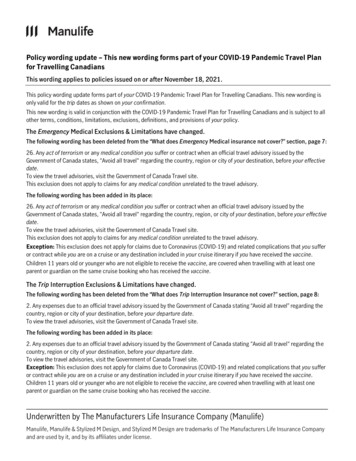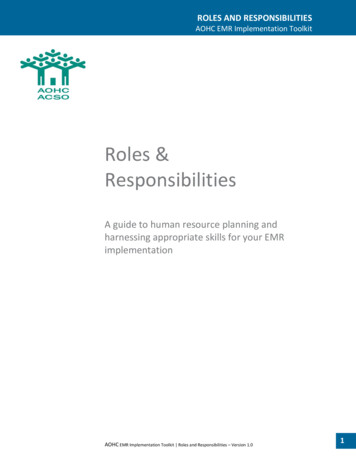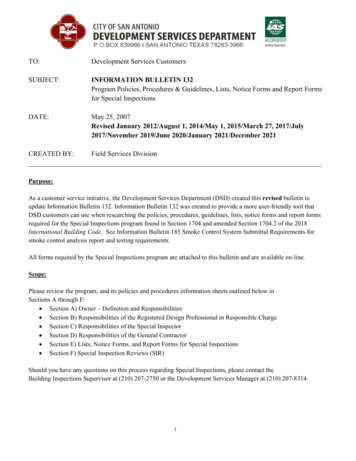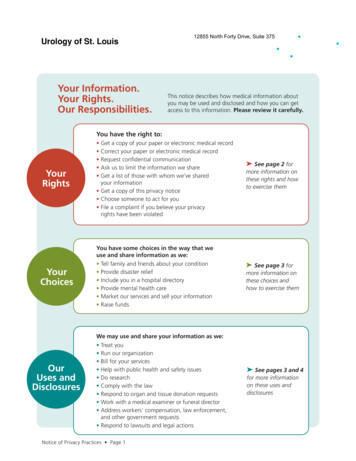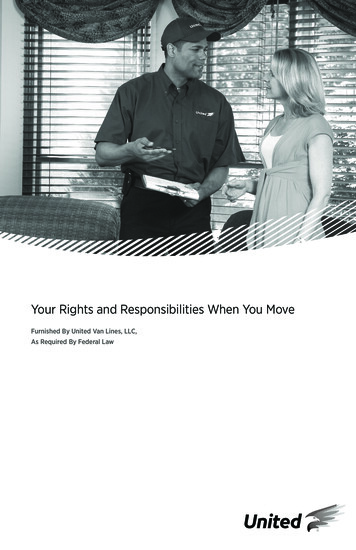
Transcription
Your Rights and Responsibilities When You MoveFurnished By United Van Lines, LLC,As Required By Federal Law
Why Was I Given This Pamphlet?The Federal Motor Carrier Safety Administration's (FMCSA) regulations protect consumers on interstatemoves and define the rights and responsibilities of consumers and household goods carriers.The household goods carrier (mover) gave you this pamphlet to provide information about your rightsand responsibilities as an individual shipper of household goods. Your primary responsibility is to selecta reputable household goods carrier, ensure that you understand the terms and conditions of thecontract, and understand and pursue the remedies that are available to you in case problems arise. Youshould talk to your mover if you have further questions. The mover will also furnish you with additionalwritten information describing its procedure for handling your questions and complaints. The additionalwritten information will include a telephone number you can call to obtain additional information aboutyour move.Notice to Your Mover:Appendix A to Part 375—Your Rights and Responsibilities When You MoveYou must furnish this document to prospective individual shippers as required by 49 CFR 375.213. Thetext as it appears in this appendix may be reprinted in a form and manner chosen by you, provided itcomplies with § 375.213(b)(2) and (b)(3). You are not required to italicize titles of sections.Your Rights And Responsibilities When You MoveOMB No. 2126-0025Furnished by Your Mover, as Required by Federal LawAuthority: 49 U.S.C. 13301, 13704, 13707, and 14104; 49 CFR 1.73.1
What Is Included In This Pamphlet?In this pamphlet, you will find a discussion of each of these topics:Why Was I Given This Pamphlet?1What Are The Most Important Points I Should Remember From This Pamphlet?4What If I Have More Questions?5Subpart A — General RequirementsWho must follow the regulations?5What definitions are used in this pamphlet?5Subpart B — Before Requesting Services From Any MoverWhat is my mover's normal liability for loss or damage when my mover accepts goods from me?9What actions by me limit or reduce my mover's normal liability?10What are dangerous or hazardous materials that may limit or reduce my mover's normalliability?May my mover have agents?1111What items must be in my mover's advertisements?11How must my mover handle complaints and inquiries?12Do I have the right to inspect my mover's tariffs (schedules of charges) applicable to my move?12Must my mover have an arbitration program?13Must my mover inform me about my rights and responsibilities under Federal Law?14What other information must my mover provide to me?14How must my mover collect charges?14May my mover collect charges upon delivery?15May my mover extend credit to me?15May my mover accept charge or credit cards for my payments?16Subpart C— Service Options ProvidedWhat service options may my mover provide?16If my mover sells liability insurance coverage, what must my mover do?17Subpart D— Estimating ChargesMust my mover estimate the transportation and accessorial charges for my move?18How must my mover estimate charges under the regulations?19What payment arrangements must my mover have in place to secure delivery of my household goodsshipment?21Subpart E— Pickup Of My Shipment Of Household Goods2Must my mover write up an order for service?22Must my mover write up an inventory of the shipment?24Must my mover write up a Bill of Lading?25
Should I reach an agreement with my mover about pickup and delivery times?25Must my mover determine the weight of my shipment?26How must my mover determine the weight of my shipment?26What must my mover do if I want to know the actual weight or charges for my shipment before delivery?29Subpart F—Transportation Of My ShipmentMust my mover transport the shipment in a timely manner?What must my mover do if it is able to deliver my shipment more than 24 hours before I am able toaccept delivery?What must my mover do for me when I store household goods in transit?293131Subpart G — Delivery Of My ShipmentMay my mover ask me to sign a delivery receipt releasing it from liability?32What is the maximum collect-on-delivery amount my mover may demand I pay at the time of delivery?32If my shipment is transported on more than one vehicle, what charges may my mover collect at delivery?32If my shipment is partially or totally lost or destroyed, what charges may my mover collect at delivery?33How must my mover calculate the charges applicable to the shipment as delivered?33Subpart H — Collection Of ChargesDoes this subpart apply to most shipments?34How must my mover present its freight or expense bill to me?34If I forced my mover to relinquish a collect-on-delivery shipment before the payment of ALL charges, howmust my mover collect the balance?36What actions may my mover take to collect from me the charges in its freight bill?36Do I have a right to file a claim to recover money for property my mover lost or damaged?36Subpart I — Resolving Disputes With My MoverWhat may I do to resolve disputes with my mover?38IMPORTANT! See additional information contained in the Appendices below. Carrier is required to furnishthis information to you prior to executing an Order for Service on your shipment of household goods.Additional Topics – AppendicesAppendix A1 – Notice of Availability of Tariff Provisions39Appendix A2 – Summary of Household Goods Arbitration Program40Appendix A3 – Summary of Customer Complaint and Inquiry Handling Procedure44Appendix A4 – Information on Claims for Loss and Damage46Appendix A5 – Glossary of Moving Terminology47Appendix A6 – Placing a Value on Your Shipment49Appendix A7 – Ready to Move? Brochure533
What Are The Most Important Points I Should Remember From This Pamphlet?1. Movers must give written estimates.2. Movers may give binding estimates.3. Non-binding estimates are not always accurate; actual charges may exceed the estimate.4. If your mover provides you (or someone representing you) with any partially complete documentfor your signature, you should verify the document is as complete as possible before signing it. Makesure the document contains all relevant shipping information, except the actual shipment weightand any other information necessary to determine the final charges for all services performed.5. You may request from your mover the availability of guaranteed pickup and delivery dates.6. Be sure you understand the mover's responsibility for loss or damage, and request an explanation ofthe difference between valuation and actual insurance.7. You have the right to be present each time your shipment is weighed.8. You may request a reweigh of your shipment.9. If you agree to move under a non-binding estimate, you should confirm with your mover—inwriting—the method of payment at delivery as cash, certified check, cashier's check, money order,or credit card.10. Movers must offer a dispute settlement program as an alternative means of settling loss or damageclaims. Ask your mover for details.11. You should ask the person you speak to whether he or she works for the actual mover or ahousehold goods broker. A household goods broker must not represent itself as a mover. Thebroker is responsible only for arranging the transportation. It does not own the trucks used totransport the shipment and is required to find an authorized mover to provide the transportation.You should know that a household goods broker generally has no authority to provide you with anestimate for the move, unless the broker has a written agreement with the household goods carrier.If a household goods broker provides you with an estimate without a written agreement with thecarrier, the estimate may not be binding and you may instead be required to pay the actual chargesassessed by the mover. A household goods broker is not responsible for loss or damage.12. You may request complaint information about movers from the Federal Motor Carrier SafetyAdministration under the Freedom of Information Act. You may be assessed a fee to obtain thisinformation. See 49 CFR part 7 for the schedule of fees.13. You should seek estimates from at least three different movers. You should not disclose anyinformation to the different movers about their competitors, as it may affect the accuracy oftheir estimates.4
What If I Have More Questions?If this pamphlet does not answer all of your questions about your move, do not hesitate to ask foradditional information from your mover's representative who handled the arrangements for your move,the driver who transports your shipment, or the mover's main office.Subpart A — General RequirementsThe primary responsibility for your protection lies with you in selecting a reputable household goodscarrier, ensuring you understand the terms and conditions of your contract with your mover, andunderstanding and pursuing the remedies that are available to you in case problems arise. Who Must Follow The Regulations?The regulations inform motor carriers engaged in the interstate transportation of household goods(household goods motor carriers or movers) what standards they must follow when offering services toyou. You, an individual shipper, are not directly subject to the regulations. However, your mover may berequired by the regulations to demand that you pay on time. The regulations apply only to a mover thatboth transports your household goods by motor vehicle in interstate commerce—that is, when you aremoving from one State to another—and provides certain types of additional services. The regulationsdo not apply when your interstate move takes place within a single commercial zone. A commercialzone is roughly equivalent to the local metropolitan area of a city or town. For example, a movebetween Brooklyn, NY, and Hackensack, NJ, would be considered within the New York City commercialzone and would not be subject to these regulations. Commercial zones are defined in 49 CFR part 372. What Definitions Are Used In This Pamphlet?Accessorial (Additional) Services — These are services such as packing, appliance servicing, unpacking,or piano stair carries that you request be performed (or that are necessary because of landlordrequirements or other special circumstances). Charges for these services may be in addition to thelinehaul charges.Advanced Charges — These are charges for services performed by someone other than the mover. Aprofessional, craftsman, or other third party may perform these services at your request. The moverpays for these services and adds the charges to your Bill of Lading charges.Advertisement — This is any communication to the public in connection with an offer or sale of anyinterstate household goods transportation service. This will include written or electronic databaselistings of your mover's name, address, and telephone number in an online database. This excludeslistings of your mover's name, address, and telephone number in a telephone directory or similarpublication. However, Yellow Pages advertising is included within the definition.Agent — A local moving company authorized to act on behalf of a larger, national company.Appliance Service By Third Party — The preparation of major electrical appliances to make them safefor shipment. Charges for these services may be in addition to the linehaul charges.5
Bill of Lading — The receipt for your goods and the contract for their transportation.Carrier — The mover transporting your household goods.Collect on Delivery (COD) — This means payment is required at the time of delivery at the destinationresidence (or warehouse).Certified Scale — Any scale designed for weighing motor vehicles, including trailers or semi-trailers notattached to a tractor, and certified by an authorized scale inspection and licensing authority. A certifiedscale may also be a platform or warehouse type scale that is properly inspected and certified.Estimate, Binding — This is a written agreement made in advance with your mover. It guarantees thetotal cost of the move based upon the quantities and services shown on the estimate.Estimate, Non-Binding — This is what your mover believes the cost will be, based upon the estimatedweight of the shipment and the accessorial services requested. A non-binding estimate is not bindingon the mover. The final charges will be based upon the actual weight of your shipment, the servicesprovided, and the tariff provisions in effect.Expedited Service — This is an agreement with the mover to perform transportation by a set date inexchange for charges based upon a higher minimum weight.Flight Charge — A charge for carrying items up or down flights of stairs. Charges for these servicesmay be in addition to the linehaul charges.Guaranteed Pickup and Delivery Service — An additional level of service featuring guaranteed dates ofservice. Your mover will provide reimbursement to you for delays. This premium service is often subjectto minimum weight requirements.High-Value Article — These are items included in a shipment valued at more than 100 per pound( 220 per kilogram).Household Goods — As used in connection with transportation, means the personal effects orproperty used, or to be used, in a dwelling, when part of the equipment or supplies of the dwelling.Transportation of the household goods must be arranged and paid for by you or by another individualon your behalf. This may include items moving from a factory or store when you purchase them to usein your dwelling. You must request that these items be transported, and you (or another individual onyour behalf) must pay the transportation charges to the mover.Household Goods Motor Carrier — This means a motor carrier that, in the ordinary course of itsbusiness of providing transportation of household goods, offers some or all of the following additionalservices: (1) Binding and non-binding estimates, (2) Inventory, (3) Protective packing and unpackingof individual items at personal residences, and (4) Loading and unloading at personal residences. Theterm does not include a motor carrier when the motor carrier provides transportation of householdgoods in containers or trailers that are entirely loaded and unloaded by an individual other than anemployee or agent of the motor carrier.6
Individual Shipper — Any person who —1. Is the shipper, consignor, or consignee of a household goods shipment;2. Is identified as the shipper, consignor, or consignee on the face of the Bill of Lading;3. Owns the goods being transported; and4. Pays his or her own tariff transportation charges.Impracticable Operations — Generally refer to services required when operating conditions make itphysically impossible for the motor carrier to perform pickup or delivery with its normally assignedroad-haul equipment, so that the carrier must use smaller equipment and/or additional labor tocomplete pickup or delivery of the shipment. A mover may require payment of additional charges forimpracticable operations even if you do not request these services. The specific services considered tobe impracticable operations by your mover are defined in your mover's tariff.Inventory — The detailed descriptive list of your household goods showing the number and conditionof each item.Linehaul Charges — The charges for the vehicle transportation portion of your move. These charges, ifseparately stated, apply in addition to the accessorial service charges.Long Carry — A charge for carrying articles excessive distances between the mover's vehicle and yourresidence. Charges for these services may be in addition to the linehaul charges.May — An option. You or your mover may do something, but it is not a requirement.Mover — A household goods motor carrier and its household goods agents.Must — A legal obligation. You or your mover must do something.Order for Service — The document authorizing the mover to transport your household goods.Order (Bill of Lading) Number — The number used to identify and track your shipment.Peak Season Rates — Higher linehaul charges applicable during the summer months.Pickup and Delivery Charges — Separate transportation charges applicable to transporting yourshipment between the storage-in-transit warehouse and your residence.Reasonable Dispatch — The performance of transportation on the dates, or during the period of time,agreed upon by you and your mover and shown on the Order for Service/Bill of Lading. For example,if your mover deliberately withholds any shipment from delivery after you offer to pay the bindingestimate or up to 110 percent of a non-binding estimate, plus any charges for additional servicesyou requested that were not included in the estimate and/or permissible charges for impracticableoperations, your mover has not transported the goods with reasonable dispatch. The term "reasonabledispatch" excludes transportation provided under your mover's tariff provisions requiring guaranteedservice dates. Your mover will have the defense of force majeure, i.e., that the contract cannot beperformed owing to causes that are outside the control of the parties and could not be avoided byexercise of due care.7
Should — A recommendation. We recommend you or your mover do something, but it is not arequirement.Shuttle Service — The use of a smaller vehicle to provide service to residences not accessible to themover's normal linehaul vehicles.Storage-In-Transit (SIT) — The temporary warehouse storage of your shipment pending furthertransportation, with or without notification to you. If you (or someone representing you) cannot acceptdelivery on the agreed-upon date or within the agreed-upon time period (for example, because yourhome is not quite ready to occupy), your mover may place your shipment into SIT without notifyingyou. In those circumstances, you will be responsible for the added charges for SIT service, as well asthe warehouse handling and final delivery charges. However, your mover also may place your shipmentinto SIT if your mover was able to make delivery before the agreed-upon date (or before the first dayof the agreed-upon delivery period) but you did not concur with early delivery. In those circumstances,your mover must notify you immediately of the SIT, and your mover is fully responsible for redeliverycharges, handling charges, and storage charges.Surface Transportation Board — An agency within the U.S. Department of Transportation that regulateshousehold goods carrier tariffs, among other responsibilities. The Surface Transportation Board'saddress is 395 E Street, SW.,Washington, DC 20423-0001. Tele. 202-245-0245.Tariff — An issuance (in whole or in part) containing rates, rules, regulations, classifications, or otherprovisions. The Surface Transportation Board requires that a tariff contain three specific items. First,an accurate description of the services the mover offers to the public. Second, the specific applicablerates (or the basis for calculating the specific applicable rates) and service terms for services offered tothe public. Third, the mover's tariff must be arranged in a way that allows you to determine the exactrate(s) and service terms applicable to your shipment.Valuation — The degree of worth of the shipment. The valuation charge compensates the mover forassuming a greater degree of liability than is provided for in its base transportation charges.Warehouse Handling — A charge may be applicable each time SIT service is provided. Charges forthese services may be in addition to the linehaul charges. This charge compensates the mover for thephysical placement and removal of items within the warehouse.We, Us, and Our — The Federal Motor Carrier Safety Administration (FMCSA).You and Your — You are an individual shipper of household goods. You are a consignor or consignee ofa household goods shipment and your mover identifies you as such in the Bill of Lading contract. Youown the goods being transported and pay the transportation charges to the mover. Where May Other Terms Used In This Pamphlet Be Defined?You may find other terms used in this pamphlet defined in 49 U.S.C. 13102. The statute controls thedefinitions in this pamphlet. If terms are used in this pamphlet and the terms are defined neither herenor in 49 U.S.C. 13102, the terms will have the ordinary practical meaning of such terms.8
Subpart B — Before Requesting Services From Any Mover What Is My Mover's Normal Liability For Loss Or Damage When My Mover Accepts GoodsFrom Me?In general, your mover is legally liable for loss or damage that occurs during performance of anytransportation of household goods and of all related services identified on your mover's lawful Bill ofLading.Your mover is liable for loss of, or damage to, any household goods to the extent provided in thecurrent Surface Transportation Board's Released Rates Order. You may obtain a copy of the currentReleased Rates Order by contacting the Surface Transportation Board at the address provided underthe definition of the Surface Transportation Board. The rate may be increased annually by your moverbased on the U.S. Department of Commerce's Cost of Living Adjustment. Your mover may haveadditional liability if your mover sells liability insurance to you.All moving companies are required to assume liability for the value of the goods transported. However,there are different levels of liability, and you should be aware of the amount of protection provided andthe charges for each option.Basically, most movers offer two different levels of liability under the terms of their tariffs and theSurface Transportation Board's Released Rates Orders. These orders govern the moving industry. Thelevels of liability are as follows:(1) Full Value PROTECTION (FVP). This is the most comprehensive option available for the protection ofyour goods. Unless you waive Full Value protection in writing and agree to Released Value Protectionas described below, your shipment will be transported under your mover's full (replacement) valuelevel of liability. If any article is lost, destroyed, or damaged while in your mover's custody, your moverwill, at its option, either: repair the article to the extent necessary to restore it to the same condition aswhen it was received by your mover, or pay you for the cost of such repairs; replace the article with anarticle of like kind; or pay you for the cost of a replacement article at the current market replacementvalue, regardless of the age of the lost or damaged article. Your mover will charge you for this level ofprotection, or you may select the Alternative Level of Liability described below.The cost for FVP is based on the value that you place on your shipment. For example, the valuationcharge for a shipment valued at 25,000 would be about 250.00. However, the exact cost for FullValue protection may vary by mover and may be further subject to various deductible levels of liabilitythat could reduce your cost. Ask your mover for the details and cost of its specific plan.Under the FVP level of liability, movers are permitted to limit their liability for loss of, or damage to,articles of extraordinary value, unless you specifically list on the shipping documents such articles forwhich you want liability coverage. An article of extraordinary value is any item whose value exceeds 100 per pound (for example, jewelry, silverware, china, furs, antiques, oriental rugs and computersoftware). Ask your mover for a complete explanation of this limitation before your move. It is yourresponsibility to study this provision carefully and to make the necessary declaration.9
(2) RELEASED VALUE Of 60 Cents Per Pound Per Article. This is the most economical protectionoption available; however, this no-cost option provides only minimal protection. Under this option, themover assumes liability for no more than 60 cents per pound per article. Loss or damage claims aresettled based on the weight of the article multiplied by 60 cents per pound. For example, if a 10-poundstereo component valued at 1,000 were lost or destroyed, the mover would be liable for no morethan 6.00 (10 pounds x 60 cents per pound). Obviously, you should think carefully before agreeing tosuch an arrangement. There is no extra charge for this minimal protection, but you must sign a specificstatement on the Bill of Lading agreeing to it. If you do not select this Alternative Level of Liability, yourshipment will be transported at the Full (Replacement) Value level of liability and you will be assessedthe applicable valuation charge.These two levels of liability are not insurance agreements governed by State insurance laws butinstead are contractual tariff levels of liability authorized under Released Rates Orders of the SurfaceTransportation Board of the U.S. Department of Transportation.In addition to these options, some movers may also offer to sell, or procure for you, separate liabilityinsurance from a third-party insurance company when you release your shipment for transportation atthe minimum released value (60 cents per pound [ 1.32 per kilogram] per article). This is not valuationcoverage governed by Federal law but optional insurance regulated under State law. If you purchasethis separate coverage and your mover is responsible for loss or damage, the mover is liable only foran amount not exceeding 60 cents per pound ( 1.32 per kilogram) per article, and the balance of theloss is recoverable from the insurance company up to the amount of insurance purchased. The mover'srepresentative can advise you of the availability of such liability insurance, and the cost.If you purchase liability insurance from or through your mover, the mover is required to issue a policy orother written record of the purchase and to provide you with a copy of the policy or other document atthe time of purchase. If the mover fails to comply with this requirement, the mover becomes fully liablefor any claim for loss or damage attributed to its negligence. What Actions By Me Limit Or Reduce My Mover's Normal Liability?Your actions may limit or reduce your mover's normal liability under the following three circumstances:1. You include perishable, dangerous, or hazardous materials in your household goods without yourmover's knowledge.2. You choose the alternative level of liability (60 cents per pound per article) but ship householdgoods valued at more than 60 cents per pound ( 1.32 per kilogram) per article.3. You fail to notify your mover in writing of articles valued at more than 100 per pound ( 220 perkilogram). (If you do notify your mover, you will be entitled to full recovery up to the declared valueof the article or articles, not to exceed the declared value of the entire shipment.)10
What Are Dangerous Or Hazardous Materials That May Limit Or Reduce My Mover's NormalLiability?Federal law forbids you to ship hazardous materials in your household goods boxes or luggage withoutinforming your mover. A violation can result in 5 years' imprisonment and penalties of 250,000 ormore (49 U.S.C. 5124). You could also lose or damage your household goods by fire, explosion, orcontamination.If you offer hazardous materials to your mover, you are considered a hazardous materials shipper andmust comply with the hazardous materials requirements in 49 CFR parts 171, 172, and 173, including butnot limited to package labeling and marking, shipping papers, and emergency response information.Your mover must comply with 49 CFR parts 171, 172, 173, and 177 as a hazardous materials carrier.Hazardous materials include explosives, compressed gases, flammable liquids and solids, oxidizers,poisons, corrosives, and radioactive materials. Examples: Nail polish remover, paints, paint thinners,lighter fluid, gasoline, fireworks, oxygen bottles, propane cylinders, automotive repair and maintenancechemicals, and radio-pharmaceuticals.There are special exceptions for small quantities (up to 70 ounces total) of medicinal and toilet articlescarried in your household goods and certain smoking materials carried on your person. For furtherinformation, contact your mover. May My Mover Have Agents?Yes, your mover may have agents. If your mover has agents, your mover must have written agreementswith its prime agents. Your mover and its retained prime agent must sign their agreements. Copies ofyour mover's prime agent agreements must be in your mover's files for a period of at least 24 monthsfollowing the date of termination of each agreement. What Items Must Be In My Mover's Advertisements?Your mover must publish and use only truthful, straightforward, and honest advertisements. Yourmover must include certain information in all advertisements for all services (including any accessorialservices incidental to or part of interstate transportation). Your mover must require each of its agentsto include the same information in its advertisements. The information must include the following twopieces of information about your mover:1. Name or trade name of the mover under whose U.S. DOT number the advertised service willoriginate.2. U.S. DOT number assigned by FMCSA authorizing your mover to operate. Your mover must displaythe information as: U.S. DOT No. (assigned number).You should compare the name or trade name of the mover and its U.S. DOT number to the nameand U.S. DOT number on the sides of the truck(s) that arrive at your residence. The names andnumbers should be identical. If the names and numbers are not identical, you should ask your moverimmediately why they are not. You should not allow the mover to load your household goods on itstruck(s) until you obtain a satisfactory response from the mover's local agent. The discrepancies maywarn of problems you will have later in your business dealings with this mover.11
How Must My Mover Handle Complaints And Inquiries?All movers are expected to respond promptly to complaints or inquiries from you, the customer. Shouldyou have a complaint or question about
3 Should I reach an agreement with my mover about pickup and delivery times? 25 Must my mover determine the weight of my shipment? 26 How must my mover determine the weight of my shipment? 26
